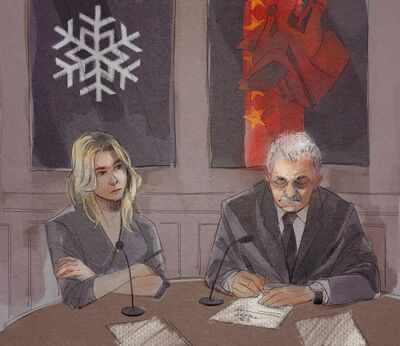Treaty of Aragon
| Treaty of Peace between the Grand Principality of Ruvelka and the Commonality of Syara | |
|---|---|
 Executive Dragomir Zhelev signs the treaty while Chancellor Edviná Molnár watches | |
| Signed | 17 July 2010 |
| Location | Aragon, Shalum |
| Effective | 19 July 2010 |
| Condition | Ratification by both parties |
| Parties | |
The Treaty of Aragon was a peace treaty signed between the Commonality of Syara and the Grand Principality of Ruvelka that ended the Zemplen War.
Following the conclusion of Operation Homefront, Ruvelka had expelled the Syaran Commonality Armed Forces from Ruvelkan soil and had recaptured much of the disputed border regions, including Zemplen itself. On 12 July Chancellor Edviná Molnár ordered the Imperial Armed Forces of Ruvelka to halt combat operations after Zovahr announced its official request for a ceasefire and a willingness to negotiate an end to the war. The two sides agreed to negotiations held in Shalum and hosted by Imperator Tyler Holland on 13 July. Three days later both Chancellor Molnár and Executive Dragomir Zhelev met in Aragon to discuss the terms of the treaty. After internal discussion, the Ruvelkan delegation presented its terms which included the full cessation of hostilities, complete transfer of prisoners of war, demobilization of both armed forces, and the re-establishment of full diplomatic relations within an appropriate time frame.
As expected Ruvelka demanded the return of the border regions of virtually all of Zemplen, Imerti, and Armavir, but to the surprise of many observers agreed to cede control of Tarnova and Rostuša to Syara as both regions were inhabited primarily by ethnic Syarans. Chancellor Molnár justified the transition of control as necessary to forestall future conflicts. The Syaran delegation, with its military in tatters, was ultimately not in a position to contest the terms and agreed to all of them. The treaty was signed by both Molnár and Zhelev at 1715 local time, officially going into effect at 0001 19 July 2010.
News of the treaty provoked mixed reactions in both countries. In Syara the fate of Tarnova and Rostuša did little to overcome the shock of the defeat and protests continued for weeks that culminated in the collapse of the Zhelev Administration. The reaction in Ruvelka was more muted as the war weary population generally celebrated the end of conflict, but Molnár's decision to make concessions to the Syarans was met with criticism from more nationalist circles. Both Syara and Ruvelka formally re-established diplomatic relations in 2011.